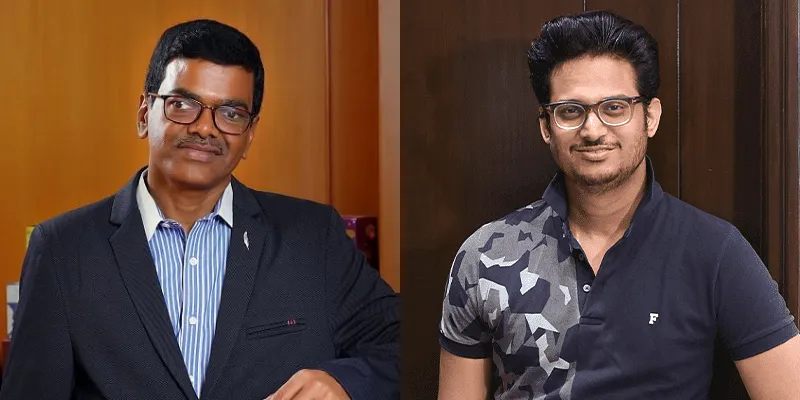From carving a niche in the footwear industry to building a cookie brand making Rs 500 Cr revenue: top SMB stories of the week
This week, SMBStory tracked the journey of some brands who overcame unique predicaments to scale success and carved a niche for themselves in their respective industries.

Small and Medium Businesses (SMBs) are known for setting benchmarks even if it means to overcome storms within the organisation or outside. The story of India and are similar. The former overcame the death of its founder while the latter decided to venture into a space already dominated by several big brands consisting of foreign and domestic players.
This week SMBStory tracked the journey of these brands who overcame unique predicaments to scale success and carved a niche for themselves in their respective industries.
Unibic India

Srini Vudaygiri, CEO of Unibic
Last year, in November, the founder of Unibic India, Nikhil Sen, passed away suddenly. He left behind a 15-year-old legacy of a popular cookie brand, which was acquired by Peepul Capital in 2012. Nikhil Sen had built the company into a Rs 380 crore brand.
Srini Vudayagiri, a partner at , took over the business as CEO in 2019. The company has already reached Rs 500 crore revenue.
“We are extremely cash efficient in our approach. The company has been profitable for many years now. We do know that we are competing with big brands. I have a huge responsibility of running Peepul Capital and Unibic India,” says Srini.
Back in 2012, it was a small team and was very innovative. Srini was part of the board since 2012 and was part of every strategic investment made. Unibic India went from being a south Indian brand in 2012 to three lakh retailers across the country in 2020.
“As a tribute to Nikhil, we did the highest brand production in the month he died and in the same month we launched a new cream wafer brand. In May 2020, we achieved full capacity at the plant during the slowdown,” says Srini.
Today the company has the largest wire cut cookie manufacturing plant in India, located in Bengaluru. The company can manufacture 100 tonnes of cookies per day. Ninety-eight percent of its capacity is used to manufacture its own brand and only two percent is used to manufacture for private label brands like CCD and Indigo Airlines.
Alberto Torresi

Ishaan Sachdeva, Director, Alberto Torresi
Dominant footwear brands such as Bata, Nike, Adidas, and Puma can claim superior product quality without being challenged. However, smaller and newer Indian footwear companies can’t rely on popular brand value to help justify the international quality of their products.
One might think this would pose a problem for Agra-based Virola International when it decided to launch footwear of European quality in the Indian market. But it was not an issue for Virola. The leading footwear manufacturer was already making shoes for the European market under its brand Alberto Torresi.
When Virola brought Alberto Torresi to Indian shores in 2010, it appointed Ishaan Sachdeva, from the business family, as the brand’s director. In the last decade, Ishaan has grown Alberto Torresi into a popular formal and casual shoes brand, taking its domestic turnover to Rs 35 crore.
Other stories of the week-
Sagacious IP

Tarun Kumar Bansal, Co-founder and President, Sagacious IP
A biologist by education, BITS Pilani graduate Tarun Kumar Bansal felt there was a lack of awareness on Intellectual Property (IP) among SMEs. Through his experience in the field of IP, research, and technology evaluation, he had seen senior executives reject learning about IP even before trying to understand its basics.
“They felt IP rights are only intended for high-tech companies operating in dynamic fields of R&D, such as consumer electronics and telecommunications. They also thought IP is a legal subject, and not a business subject. Even legal departments didn’t understand its importance, and would care only when they received an infringement notice,” Tarun tells SMBStory in an exclusive interview.
Partnering with Anant Kataria, another IP, research, and development professional, Tarun set out to solve this problem. The two started Sagacious IP in 2008, and set up their first office in Gurugram. Through Sagacious IP, they started creating impact across the IP life-cycle, right from supporting IP strategy formulation, mitigating IP risks, and creating IP for commercialisation and monetisation.
Now, with nine distinct service lines, Sagacious IP has become a prominent service provider in IP research and a partner for many global Fortune 500 companies as well as SMEs. It claims to serve more than 2,000 clients from over 60 countries with more than 12,500 projects.
Plix

Rishubh Satiya, Founder and CEO, Plix
The COVID-19 pandemic has awakened the world to the importance of being fit and healthy. Over the years, changes in lifestyle and urbanisation have led to laying more emphasis on earning more money, and amidst this, self-care and healthy habits have taken a backseat.
In fact, for people living in urban pockets, this trend holds true where life is extremely fast so much so that one seems to be running against time all the time.
To help millennials not to miss out on their health and daily nutrition, Mumbai-based is offering its customers plant-based protein foods. Founded by Rishubh Satiya in March 2019, the company recently launched its Immunity Boosting Supergreens powder.
Plix’s products are listed on ecommerce platforms like Amazon and its own website. It claims to fulfill a total of 6,000 orders every month. Without divulging the exact revenue numbers, the founder shares that the revenue of the company has grown 20x over the last one year.
Edited by Javed Gaihlot







